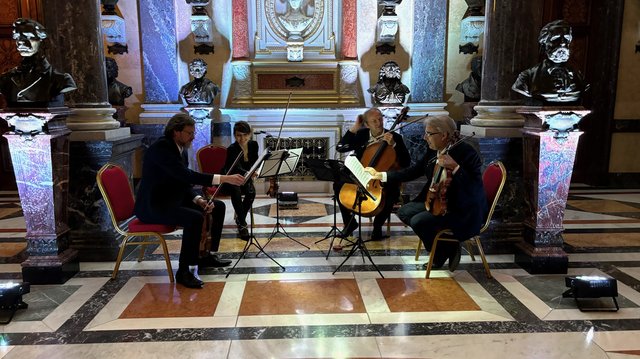The RIPE Chair team reports on outcomes from the RIPE 89 Meeting in Prague and important developments coming out of other industry events through the month.
Since I was pretty much on travel all through November, this report comes a little later than usual and is also a bit longer. I hope you will find it informative!
Highlights and follow-up from RIPE 89
We had a productive RIPE 89 meeting in Prague with 769 attendees from 60 countries, both online and offline. You can find a summary in the daily report here on RIPE Labs put together by the RIPE NCC.

There were many good presentations and engaged debates, some of which continue on the mailing lists - see for instance the discussion on the IPv6 WG mailing list following a presentation by Geoff Huston. There is also feedback provided to the policy proposals presented during the Address Policy WG session on the Address Policy WG mailing list. It was also good to see interaction with speakers from the IETF who made an effort to reach out to the operators community to gather input for the workshop on network management operations that is planned for December.
Consensus building in RIPE
During the BCOP TF it was proposed to possibly document the way we build consensus in the RIPE community (which might be different from the consensus building process in other communities or industries). While some people agreed that this could be useful, especially for new RIPE participants, there were also concerns that by specifying this too much, we might loose flexibility. We will need more discussion before we can decide if such an activity is supported by the community. In the meantime, I would recommend you to look at the slides and especially the list of existing documents at the end.
Feedback from newcomers
After the RIPE Meeting, we organised an online session where anyone for whom RIPE 89 was their first RIPE meeting was invited to tell us about their experience. It was good to hear that new participants experienced our community as open and welcoming and that they find the newcomers sessions and the mentorship programme useful. Some concrete suggestions were made on how to make it easier for newcomers to find their mentors and in general to find and meet others in the community, for instance from the same country or with a certain topic of interest. There might also be a role for session chairs to help better involve newcomers in discussion.
RIPE 89 Community Plenary
We had a packed community plenary agenda with a wide range of topics relevant for the entire community. I am only highlighting some of the discussions here. You can find the agenda and the draft minutes of the session online.
Relationship between RIPE and the RIPE NCC
We presented the draft document that we published on the RIPE List before the RIPE Meeting during the Community Plenary. As a next step, we will look at all the feedback received before the deadline of 25 November and will work on version 2. One structural change that will be made is to take out the History section and publish this as a separate document or web page. This will allow the community to focus on the main topic and purpose of this document.
RIPE NomCom process
After Jan Zorz, the chair of the 2025 RIPE NomCom, presented the process to select the next RIPE Chair Team, there was a discussion about the process itself and how it could possibly be improved. The outcome was that while the community might want to review the overall process for the next NomCom round, the current process will be run as defined in the agreed RIPE documents.
ASO AC elections and activities
The Number Resource Organization Numbers Council (NRO NC) that also serves as the Address Supporting Organization Address Council (ASO AC) was looking for an additional member from the RIPE region and during RIPE 89, Andrei Robachevsky was elected for a three year term. Currently, the ASO AC is busy reviewing the Criteria for Establishment of New Regional Internet Registries (also known as ICP-2) and has published a number principles. The AC is now looking for feedback on these principles before 6 December. You can find more background information in this RIPE Labs article.
Industry events
IETF 121, Dublin, Ireland
The IETF took place the week after the RIPE Meeting. The GREEN WG was briefly mentioned during the IETF presentation at RIPE 89. After a couple of BoFs, the WG had its first meeting at IETF 121 where the attendees agreed on a number of work items and the general direction of the work.
During the IAB Open session, Olaf Kolkman from The Internet Society presented the outcomes of the UN’s Global Digital Compact (GDC). Thanks to continued feedback from various stakeholders, including the technical community, the outcome as such is not too bad in terms of support for the multistakeholder process. However, the actual process that led to this outcome has been criticised by many as not being open and therefore hard to participate in. The question many organisations are now confronted with is as follows: By endorsing the final GDC document, do we thereby endorse the underlying process and pave the path for future processes that make it difficult to non-governmental players to participate?
As this was Niall's second IETF meeting, he was one of the "Newcomers", for whom there were a number of targeted events. These, and the regular coffee breaks, presented plenty of opportunities to talk about RIPE, the RIPE NCC, and the wider RIR system. Some of the people who regularly participate in RIPE, or used to do so, are also engaged in the IETF. However, most IETFers are not involved in both communities; seeing a badge with the affiliation "RIPE" often prompted a question which was a useful opportunity for "flying the flag".
The INEX staff organised an interesting side event during the week with a panel discussion that touched on topics such as the increased centralisation on the Internet, mistakes made in the past and how we can ensure that principles such as “permissonless innovation” are carried forward.
ICANN 81, Istanbul, Turkey
The week after the IETF meeting, the ICANN meeting took place in Istanbul. During the week, the ASO AC held a number of work sessions during which they discussed the timeline for their work on the revised ICP-2 document and other related activities. It was interesting to be with this group of passionate volunteers and to observe their work. Part of their activities during the week was a joint session with the ICANN Government Advisory Council (GAC) in which GAC members could ask questions about the proposed principles (see more above). Their main interest was related to principles such as stability and anti-capture. You can read the ICANN 81 Communiqué of the GAC.

DENOG 16, Berlin, Germany
I hadn't been at a DENOG meeting for some years and was impressed how it has grown and how well organised and moderated the event was. The content was mostly technical with presentations related to various aspects of networking, but there was also a talk by Ulrich Plate describing the implementation requirements for the NIS2 Directive in Germany. I would also like to highlight a presentation by Prof. Dr. Vaibhav Bajpai who looked at the state of DNS privacy based on RIPE Atlas measurements.
DD-IX, Dresden, Germany
And since I was already in Berlin, I was happy to accept the invitation of the group that is behind DD-IX - the new Internet Exchange Point in Dresden - to speak at their opening event. The initiative and energy shown by this group is impressive and it is great so see that many of them have become active participants in the RIPE community. You can find a series of articles about the build-up of this new IXP on RIPE Labs.



Comments 0
The comments section is closed for articles published more than a year ago. If you'd like to inform us of any issues, please contact us.